Ata-ul-Haye Nasir, Ahmadiyya Archive & Research Centre

In September 1893, the “World’s Parliament of Religions” was held as part of the World’s Columbian Exposition in Chicago, and this event, according to The Toronto Mail, marked “a distinct stage in the history of religion” and that “there was never a time in all the past in which such a gathering could have taken place.”1
The 1924 Conference on Some Living Religions Within the Empire was a continuation of such endeavours and was graced with an address by Hazrat Musleh-e-Maudra. This was followed by multiple efforts to hold worldwide religious conferences.
For instance, in the late 1920s, the Church Peace Union of America put forward the idea of the Universal Religious Peace Conference. Hazrat Maulvi AR Dardra – the then Imam of the Fazl Mosque – was a member of its Provisional Committee and represented Islam in the Preliminary Meeting in September 1928.
Another such endeavour was the First International Congress of the World Fellowship of Faiths – also known as the Second World’s Parliament of Religions – held in Chicago. This event featured 83 meetings, during which 242 addresses were delivered by 199 speakers from various faiths, races, and countries.
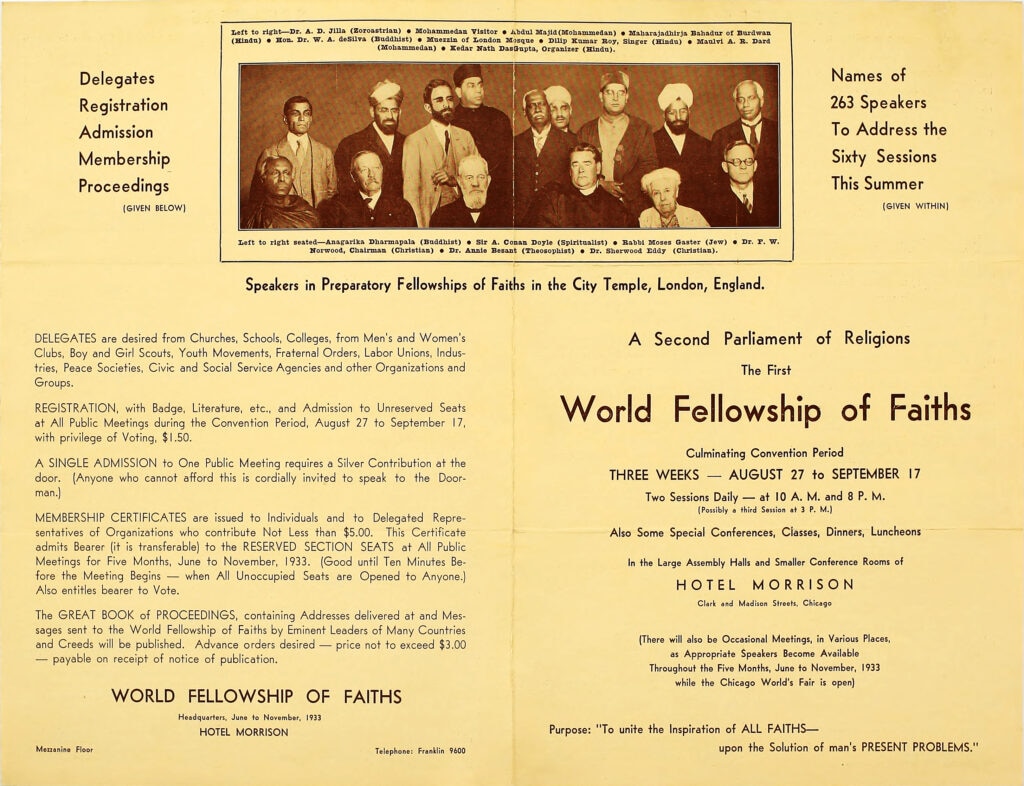
World Fellowship of Faiths and Ahmadiyya missionaries
The World Fellowship of Faiths was a fruit of the efforts – spanning around 25 years – of various movements, which joined together to fulfil their common goal: fostering religious and cultural unity.
In England in 1910, “The Union of East and West” began its work for cultural unity. It was established by Kedar Nath Das Gupta, who also had the opportunity to have meetings with Hazrat Musleh-e-Maudra during his visit to England in 1924. In 1918, “The League of Neighbors,” established by Charles Frederick Weller, commenced working for racial unity in America. In 1924, the “Fellowship of Faiths” also began developing spiritual unity.2
Particularly looking at the Fellowship of Faiths, we learn that it held regular meetings. For instance, on 21 July 1927, a meeting was held at the City Temple London, and according to the Westminster Gazette, it was attended by Hazrat Maulvi Abdur Rahim Dardra who delivered a speech as well.3
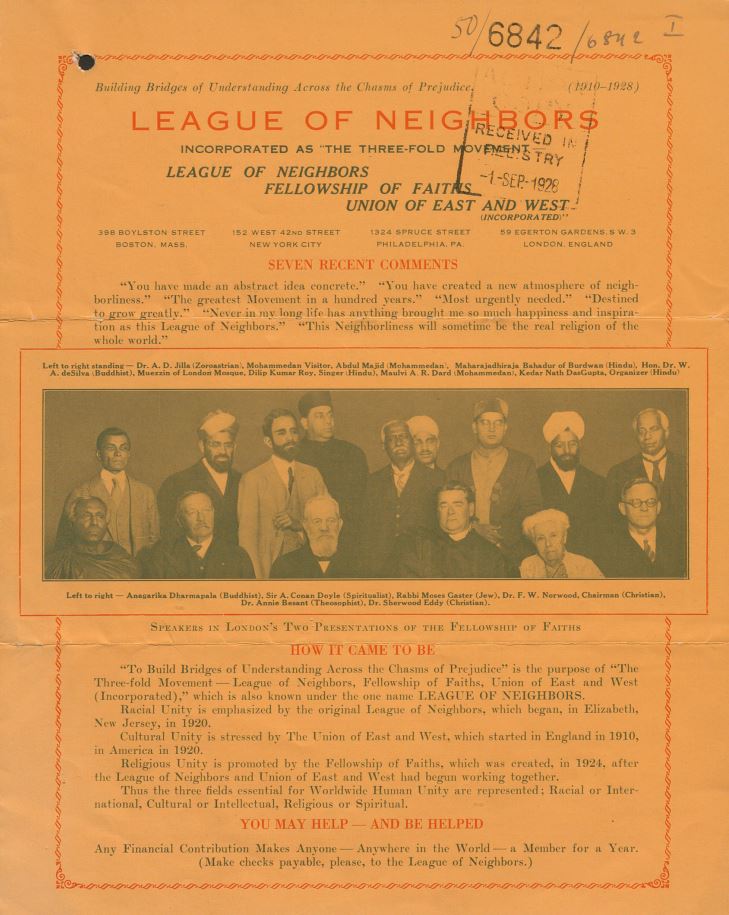
This meeting was reported by many other periodicals, such as The Christian Century of 25 August 1927, Prabuddha Bharata of September 1927, The Unity of 17 October 1927, Buddhism in England (Vol. 2, No. 4), and The Australian Jewish Herald of 3 November 1927.
Another meeting was held on 3 October 1927 and attended by Dard Sahibra. The Advertiser of Adelaide reported:
“One is apt, after reading ‘Sheik’ novels, to imagine that the true believer in Islam shouts ‘death to the infidel’ immediately he sees a Christian. Yet the Moslem believes Christ to have been a true prophet of God; his name is mentioned 23 times in the Koran – nine times as the Messiah – while His Mother’s name appears 31 times.
“These facts were made known by Maulvi A. R. Dard, of the London Mosque, at one of the most cosmopolitan gatherings ever held in London.”4
The above-mentioned movements were incorporated in 1928 as “The Threefold Movement – Union of East and West, League of Neighbors, Fellowship of Faiths,” and a joint work developed into the “World Fellowship of Faiths” in 1929.
A report on the activities of The Threefold Movement between October 1928 and June 1929, states, “Three visits to the London Mosque at Southfields were arranged, by request, in May and June.”5
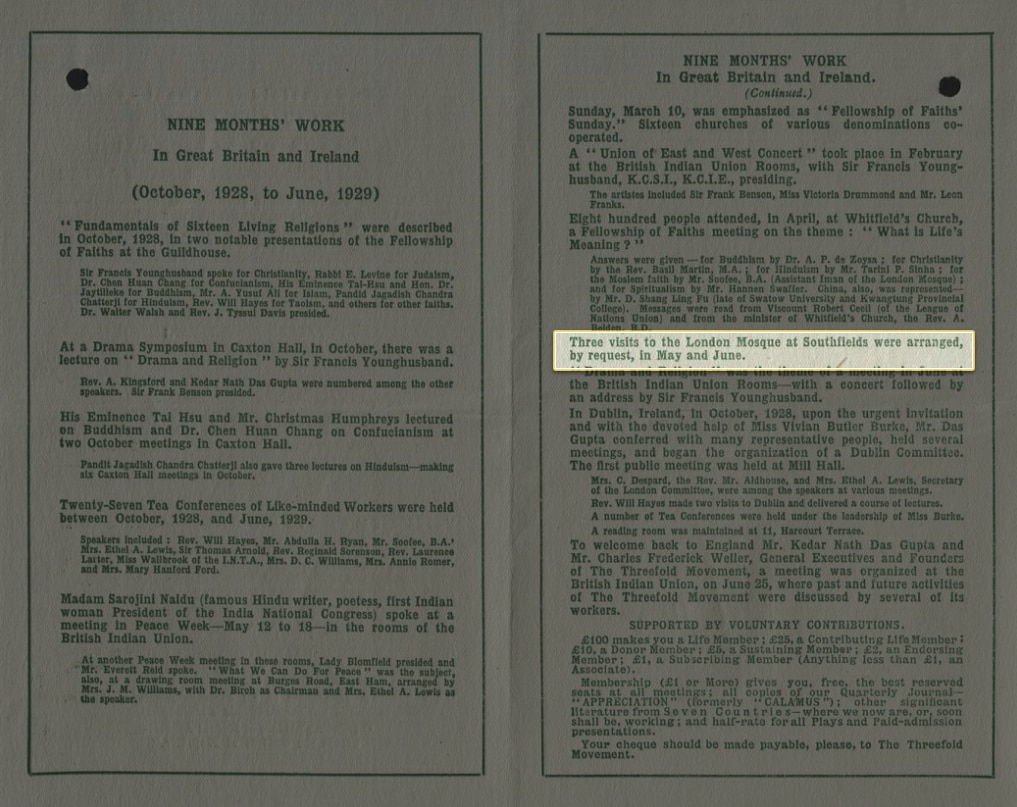
The Fellowship of Faiths was active in Chicago as well and held regular meetings. The first mass meeting was held on 17 May 1929 and the Ahmadiyya missionary, Sufi Mutiur Rahman Sahib Bengalee, represented Islam.6 Announcing this meeting, the Chicago Daily Tribune wrote, “The service will open with the famous Moslem call to prayer by Sufi M. R. Bengalee, head of the Indian-Mohammedan missionary effort in America.”7 Sufi Sahib represented Islam at further meetings also, for instance, in April 19308 and May 1932.9
This movement faced some criticism from the Christians there. An editorial of The Sunday School Times of Philadelphia criticised it and mentioned the Ahmadiyya missionary:
“Six of these local branches are preparing for a great meeting of the world-wide Fellowship of Faiths to be held in Chicago in 1933, and also for other local fellowships throughout the world. Well-known professing Christian leaders, even a bishop; are named on the Chicago committee, together with such names as Chandra Darma Sena Gooneratne, Sufi Mutiur Rahman Bengalee, and Rabbi Jacob Singer.”10
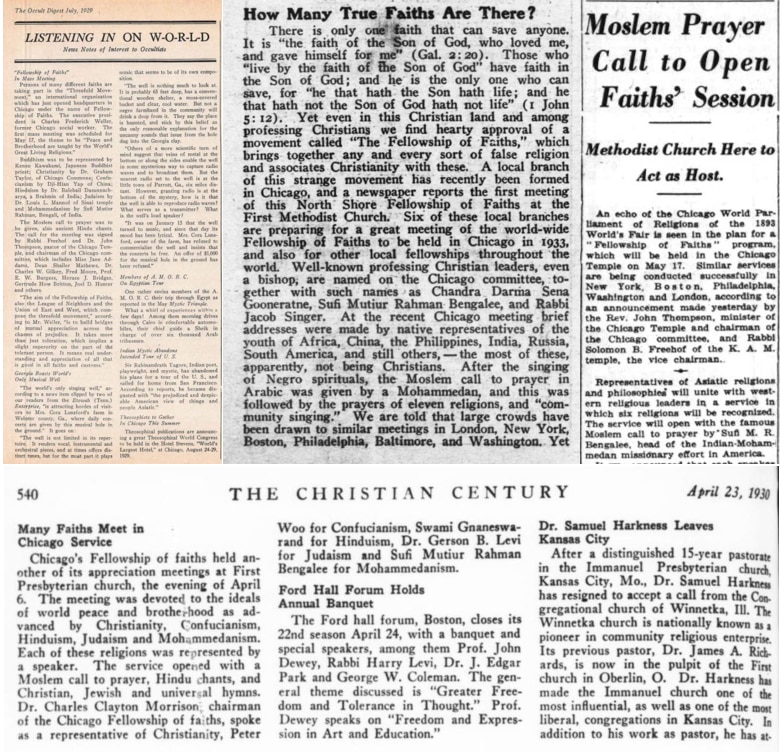
First International Congress of the World Fellowship of Faiths
In 1933-34, following the trails of the World’s Columbian Exposition of 1893, an exposition was held in America, titled “A Century of Progress International Exposition”, and just like 1893, it included a religious conference, known as the Second World’s Parliament of Religions. The first session was held on 18 June 1933 and the Culminating Convention Period spanned between 27 August to 17 September 1933.
In 1932, an American periodical mentioned the upcoming conference and gave a list of members of the General Committee of the Fellowship of Faiths in America, including Sufi Mutiur Rahman Sahib Bengalee.11
In a letter dated 23 February 1932, the General Executive of The Threefold Movement – Charles Frederick Weller – asked the Secretary-General of The League of Nations – Sir Eric Drummond – for his comments on the “‘Tentative Plans’ for the First World Fellowship of Faiths.”12 This letter shows the name of Sufi Mutiur Rahman Sahib among the committee members of Chicago’s Fellowship of Faiths.
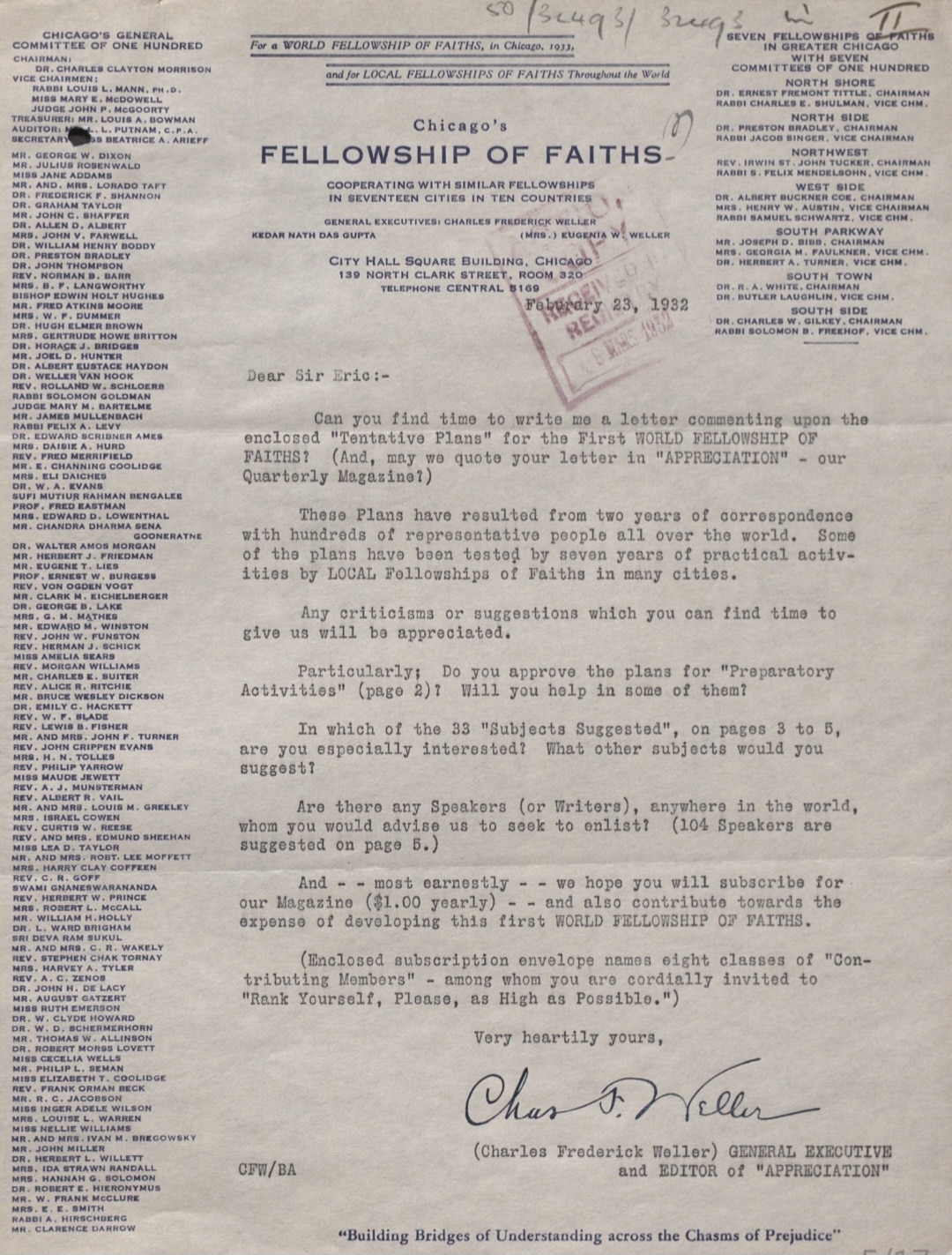
Thereafter, in a letter dated 15 June 1932, the Vice President of the World Fellowship of Faiths – Rabbi Stephen Samuel Wise – sent an invitation to the Secretary-General which was followed by an internal correspondence between the Information Section and the Assistant to the Secretary-General – Mr Wilson – who suggested that “the Secretary-General ought to send a friendly acknowledgment of this invitation but not very much more.” Thereafter, in a letter dated 25 July 1932, the World Fellowship of Faiths was made aware of his inability to attend the event.13
i) Invitation to Hazrat Musleh-e-Maudra
Hazrat Musleh-e-Maudra received an invitation from the Vice President of the World Fellowship of Faiths. The organisers requested Huzoorra to attend the conference personally, or at least send one or two representatives. Huzoorra instructed the missionaries in America, Sufi Mutiur Rahman Sahib Bengali and Mian Muhammad Yusuf Sahib, to attend the event, and graciously penned a powerful message to be read out there. This message was sent by telegram on 22 August 1933.14
The Indian Express wrote:
“According to the revised list there are to be over 260 speakers representing all the great religions as well as most of the less religious trends of social, political, and philosophical thought.”
The article further gave a list of Indian speakers and wrote, “Sufi Mutiur Rahman Bengalee, delegated by the Ahmadiyya movement in Islam, Qadian”.15
The First World Fellowship of Faiths of 1933, known as the Second Parliament of World’s Religions, differed from that of 1893 in two fundamentals:
“First; Not only all Religions were invited but all Faiths – all types of spiritual consciousness which are determining the actual lives of significant groups. Second; Instead of a competitive parade of rival religions, all were challenged to focus their best inspiration upon the solution of man’s Present Problems – such as War, Persecution, Prejudice, Poverty-Amidst-Plenty, Antagonistic Nationalisms, Ignorance, Hatred, Fear.”16
Reporting on its first meeting, The New York Times reported:
“Chicago, June 18 – The World Fellowship of Faiths, a parliament of religions, held its first meeting at the New England Congregational Church here tonight. Miss Jane Addams of Hull House presided. Prayers of a dozen different faiths were offered, including those of Africans and American Indians.”17
ii) Hazrat Musleh-e-Maud’sra message
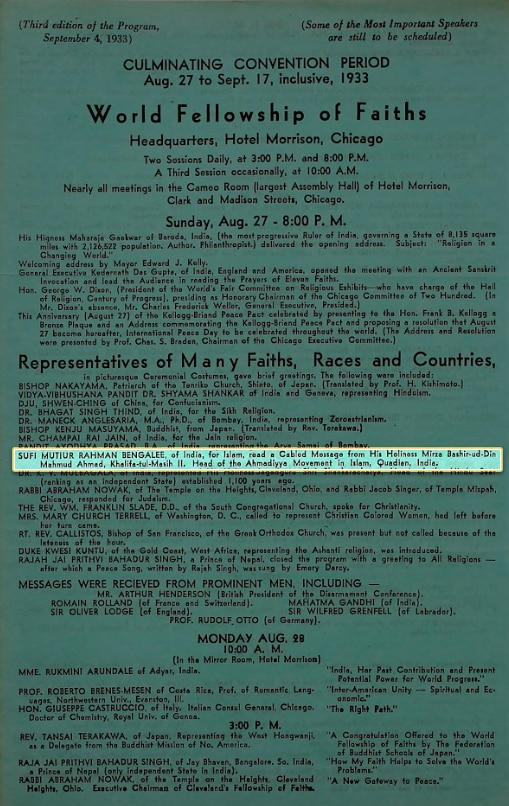
The special message by Hazrat Musleh-e-Maudra was read out by Sufi Mutiur Rahman Sahib during the Culminating Convention Period at the First International Congress of the World Fellowship of Faiths, on 27 August 1933.
The official record mentions:
“Sufi Mutiur Rahman Bengalee, of India, for Islam, read a Cabled Message from His Holiness Mirza Bashir-ud-Din Mahmud Ahmad, Khalifa-tul-Masih II, Head of the Ahmadiyya Movement in Islam, Quadian, India.”
The Civil and Military Gazette wrote under the heading “World Fellowship of Faith: A Greeting from Ahmadiyyas”:
“The World Fellowship of Faiths, an international body which is holding a conference in Chicago beginning on August 27, has received the following message from the head of the Ahmadiyya Community.” This was followed by the message.18
An article published in The Modern Review, titled “World Fellowship of Faiths” by Ida M Gurwell, stated:
“Then came the following greeting, in part, from Mirza Bashir-ud-Din Mahmud Ahamad [sic.], Khalifa-Tul-Masih II, Head of the Ahmadiyya Movement in Islam, Qudian [sic.], India.” This was followed by the message.19
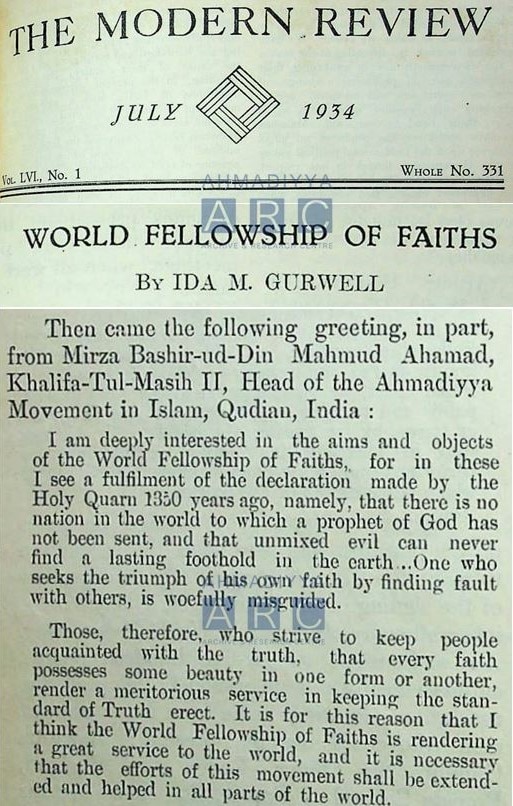
The transcript of Hazrat Khalifatul Masih II’sra message, according to the official records of the event, was as follows:
“I am deeply interested in the aims and objects of the World Fellowship of Faiths, for in these I see the fulfilment of the declaration made by the Holy Quran 1350 years ago namely that there is no nation in the world to which a prophet of God has not been sent and that unmixed evil can never find a lasting footing in the earth. The faiths that have been publicly preaching their teachings for hundreds and thousands of years and have succeeded in winning the zealous devotion of millions of men could not possibly have sprung from an impure and filthy source or lost all their original beauty and charm.
“I am not one of those who think that man can attain nearness to God by following any path but I do believe that in order to enable people to reach a tower of light well-lit roads are a necessity. He who makes the road dark does indeed try to make the tower desolate. Similarly one who sees the triumph of his own faith by finding fault with others is woefully misguided. If the light of God is not present in every country and every nation in some form or other, people will lose their power of vision and when the power of vision is lost light is of no avail. Those, therefore, who strive to make people acquainted with the truth that every faith possesses some beauty in one form or another, render a meritorious service in keeping the standard of truth erect.
“It is for this reason that I think that the World Fellowship of Faiths is rendering a great service to the world and it is necessary that the efforts of this movement should be extended and helped in all parts of the world. I as Head of the Ahmadiya Community, promise to render this society every help in my power and I assure them that in these days the will of our Lord God is also in support of their efforts. The angels in heaven are sounding the trumpet of peace. He who does not listen to this heavenly call today shall listen to it tomorrow and he who will not listen to it tomorrow shall listen to it the day after but listen he shall. Blessed are they who bury the hatchet at the first call and extend to their brethren the hand of Peace and goodwill for it is they over whose hand will be the hand of God and it is they who will inherit the kingdom of Heaven.”20
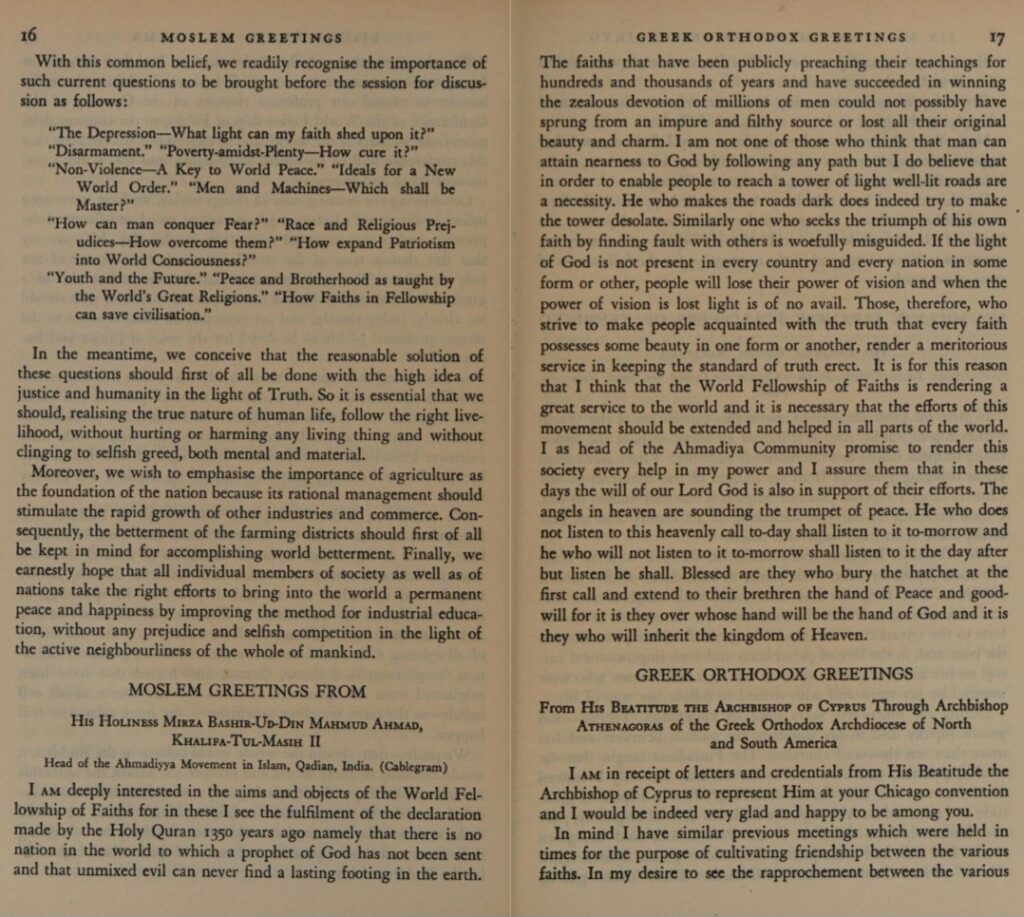
iii) Letters from the Chairman and General Executive
This message impressed the audience and Francis J McConnell (1871-1953), Chairman of the New York Committee of the World Fellowship of Faiths, wrote a letter of thanks to Huzoorra, mentioning that his message was read out at the opening of the Culminating Convention Period on 27 August 1933, in the afternoon, which was the peak time of that event. He remarked that all the listeners loved the pure words of Huzoorra.21
Mr Charles Frederick Weller (1870-1957), General Executive of the World Fellowship of Faiths, sent a letter of appreciation and wrote:
“We appreciate heartily the cabled greetings from Hazrat Mirza Bashir-ud-Din Mahmud Ahmad[ra], Khalifa-tul-Masih II, Head of the Ahmadiyya Movement in Islam, Qadian, India. His inspiring message was read at the opening of the Culminating Convention Period of the World Fellowship of Faiths on Sunday evening, August 27, in the Hotel Morrison, Chicago. […]
“It is appropriate that Hazrat Khalifa-tul-Masih’s message was read at the opening session by Sufi Mutiur Rahman Bengalee, who has been an intimate friend of the Fellowship of Faiths and a prominent speaker in many of the meetings since he came to America in 1929.”22
Mentioning the three Ahmadi speakers during the conference, he said:
“Through these three leaders who were personally present at several sessions and through the helpful message which came directly from Hazrat, Khalifa-tul-Masih, the Head of the Ahmadiyya Movement, we were made to feel – and to appreciate very heartily – the high idealism, the neighbourly cooperation, and the deeply religious consciousness with which the Ahmadiyya Movement in Islam contributed leadership and labor to the success of the World Fellowship of Faiths.”23
iv) Speeches by Ahmadi representatives
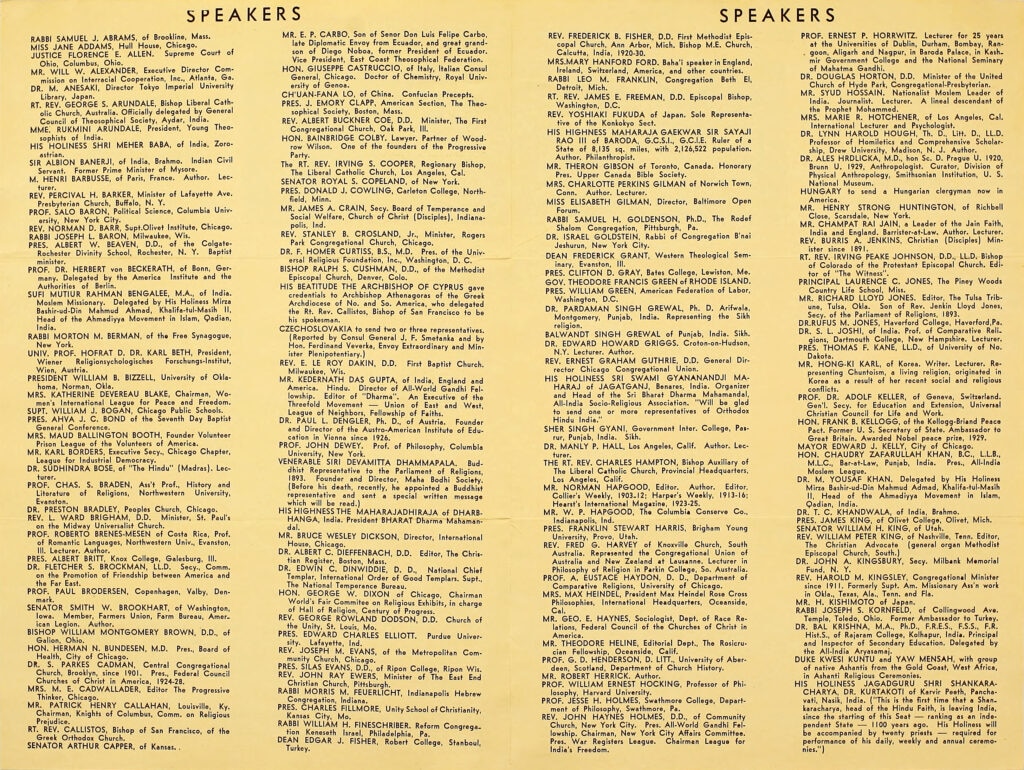
On 1 September 1933, Hazrat Sir Zafrulla Khanra delivered a speech at the conference on “Islam promoting world unity, peace and progress”.24
Mr Charles Frederick Weller expressed:
“The Hon. Chaudhry Zafarulla Khan, B.A., LL.B., M.L.C., Bar-at-Law, former President of the All-India Moslem League, made a profound impression by his modest but masterly address at the evening session, Friday, September first, on ‘Islam Promoting World Unity, Peace and Progress.’ His leadership was also helpfully manifested in the intimate conference of speakers from many lands who helped to form the new Working Committee in India of the World Fellowship of Faiths. Mr. Khan pleased us all by accepting membership in this Indian Working Committee and in the International Committee which is to be developed – with His Highness the Maharaja Gaekwar of Baroda, India, as International President. Mr. Khan’s promised leadership and labor in behalf of the World Fellowship of Faiths is an appreciated, great acquisition to the cause.”25
On 5 September 1933, Dr Muhammad Yusuf Khan Sahib delivered a speech on “Islam Overcoming Racial and Religious Prejudices”.26
Mr Charles Frederick Weller expressed:
“Dr. M. Yousuf Khan, delegated by the Head of the Ahmadiyya Movement, gave an admirable address in the evening session, Tuesday, September 5, on ‘Overcoming Racial and Religious Prejudices.’”27
On 14 September 1933, Sufi Mutiur Rahman Sahib delivered a speech at the conference on “Islam: The Solution of the World Problems”.28
Mr Charles Frederick Weller expressed:
“Sufi Bengalee’s thoughtful, informing address on ‘Islam the Solution of World Problems’, was an effective contribution to the evening session, on Thursday, September 14.”29
World Fellowship of Faiths in England
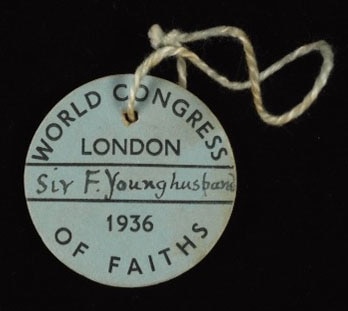
Sir Francis Edward Younghusband, KCSI KCIE (1863-1942) was the British Chairman of the World Fellowship of Faiths. He could not attend the 1933 conference in Chicago. However, he attended a few meetings in 1934 which were held as an extension to this in New York and some other places.
Sir Francis decided to expand the idea of such a conference to England as well. Hence, he announced that the Second International Congress of the World Fellowship of Faiths, commonly known as the World Congress of Faiths, would be held in July 1936. Hazrat Maulvi Abdur Rahim Dardra was a member of the British National Council of this Congress.
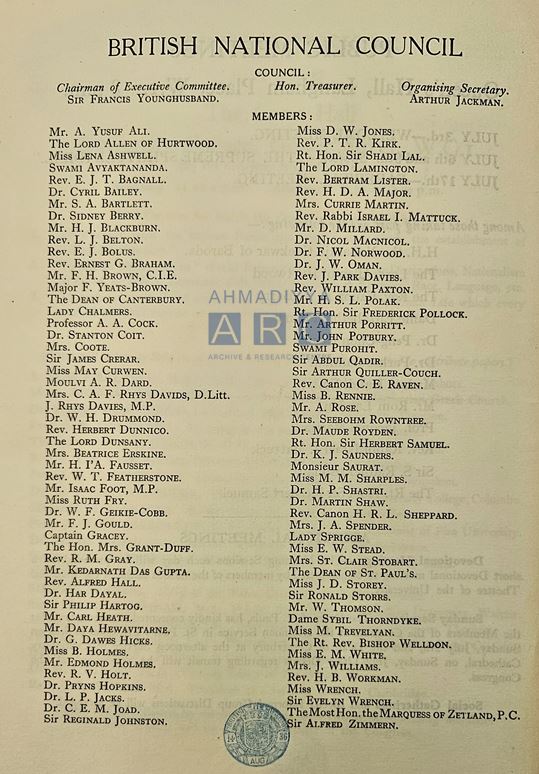
As mentioned above, Hazrat Musleh-e-Maudra had also wished in his special message for the First International Congress that “the World Fellowship of Faiths is rendering a great service to the world and it is necessary that the efforts of this movement should be extended and helped in all parts of the world.”30
The official prospectus of the World Congress of Faiths stated:
“At the First International Congress of the World Fellowship of Faiths held in Chicago in 1933 a suggestion was made that a second Congress should be held in London in 1936. Those interested in the proposal held a meeting in London in November 1934, and decided to form a British National Council to carry out this suggestion.

“At the first meeting of this Council, on the motion of Sir Evelyn Wrench, seconded by Sir Ronald Storrs, Sir Francis Younghusband was elected Chairman, and the Council then appointed an Executive Committee to carry out the more detailed work of organisation.”31
As mentioned above, the Second International Congress of the World Fellowship of Faiths was held in London, in July 1936.
i) Hazrat Musleh-e-Maud’sra message
Looking at the official records of the 1936 World Congress of Faiths, we find that Hazrat Maulvi Abdur Rahim Dardra represented Islam and read out the special message from Hazrat Musleh-e-Maudra and the English rendering of a Persian poem of the Promised Messiahas during his speech on 16 July 1936.
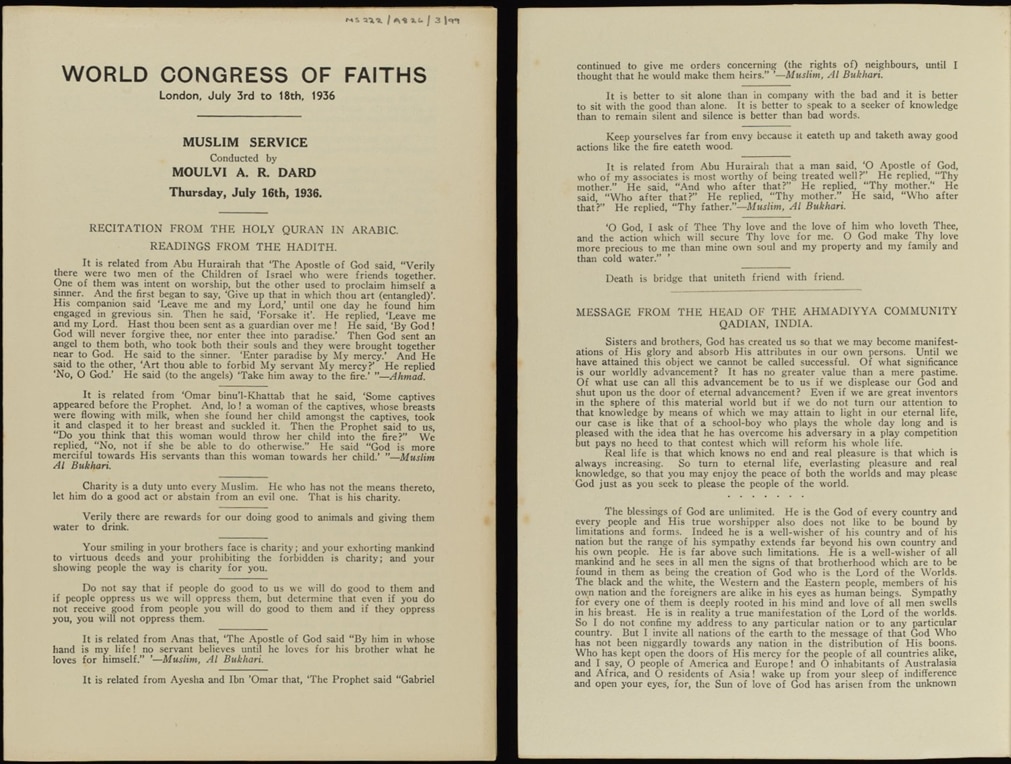
In his message, Hazrat Musleh-e-Maudra said:
“Sisters and brothers, God has created us so that we may become manifestations of His glory and absorb His attributes in our own persons. Until we have attained this object we cannot be called successful. Of what significance is our worldly advancement? It has no greater value than a mere pastime. Of what use can all this advancement be to us if we displease our God and shut upon us the door of eternal advancement? Even if we are great inventors in the sphere of this material world but if we do not turn our attention to that knowledge by means of which we may attain to light in our eternal life, our case is like that of a school-boy who plays the whole day long and is pleased with the idea that he has overcome his adversary in a play competition but pays no heed to that contest which will reform his whole life.
“Real life is that which knows no end and real pleasure is that which is always increasing. So turn to eternal life, everlasting pleasure and real knowledge, so that you may enjoy the peace of both the worlds and may please God just as you seek to please the people of the world.”
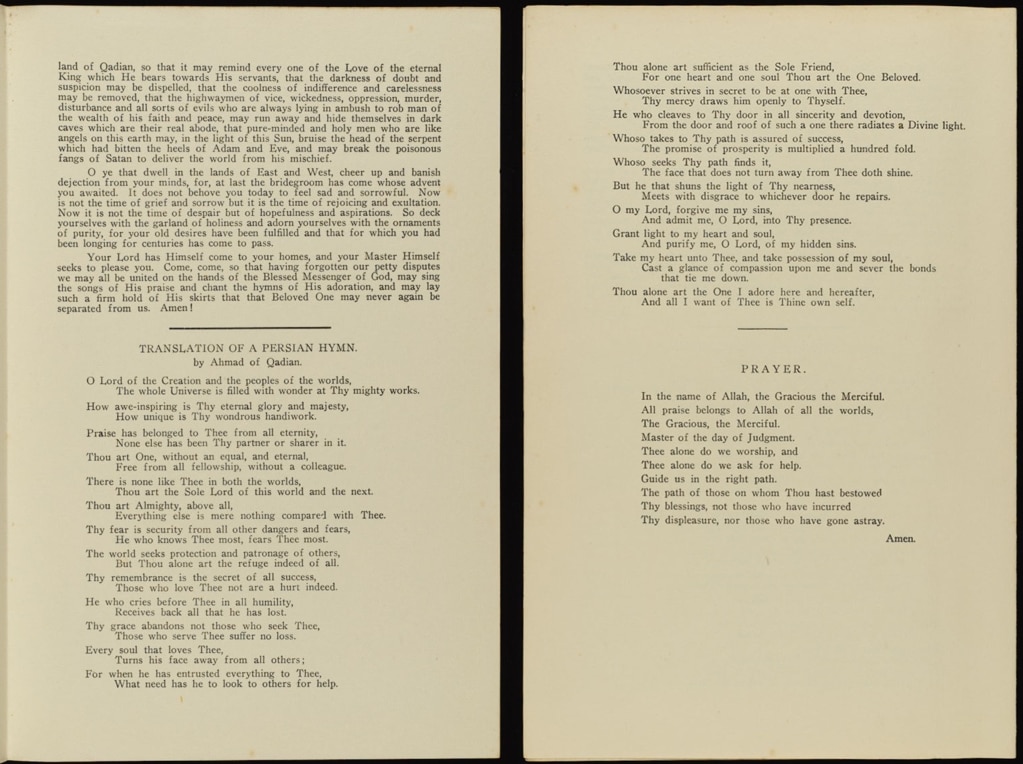
ii) Hazrat Maulvi A. R. Dard’sra speech
Rev Dr Marcus Braybrooke – the current Joint President of the World Congress of Faiths – has narrated the details of this Congress, and mentioned the Ahmadiyya missionary in the following words:
“On the one hand, the Revd P. T. R. Kirk claimed that Christianity must be accepted by the whole of mankind, and Moulvri [sic.] A. R. Dard made a similar claim for the Ahmadiyya community.”32
Sir Francis has also written that following Rev Kirk’s speech, “Maulvi Dard led the debate. He is the zealous Minister of the Mosque at Wimbledon, and a missionary of the Qadiani Sect. With perfect courtesy he disagreed with some of Mr. Kirk’s conclusions. Especially did he disagree with the statements: (1) that Western civilisation alone holds the key to reconciliation; (2) that it is in Christ alone and at His Cross that reconciliation will be found, and (3) that the real issue today is Christ or atheism. ‘I have a profound conviction,’ said the Maulvi, ‘that Islam alone can establish peace and true fellowship among mankind, because it is the final and the fullest revelation of God.’”
He further wrote that answering the question that if God loves His creatures, why should He not guide erring humanity by His word?, “the Maulvi replied that God had sent His word even today by the mouth of Ahmad of Qadian, just as He spoke to the Prophets and Saints of yore.”33
The Latter-day Saints’ Millennial Star – an organ of the Church of Jesus Christ of Latter-day Saints, reported, “President Merrill takes the chair at the afternoon session, Thursday, July 16, with the Reverend P. T. R. Kirk as the speaker and Moulvi A. R. Dard leading the debate. […] Moulvi A. R. Dard is a Muslim. He is Imam (officiating priest of a mosque) of London, and a member of Ahmadiya Community.”34
iii) Ahmadi representatives at further meetings of the Congress
We learn an interesting fact from the official records that during a meeting of the Executive Committee, on 27 April 1937, Sir Francis said that during his recent visit to India, he spoke at various events, including one organised by the “Ahmadya Community”.
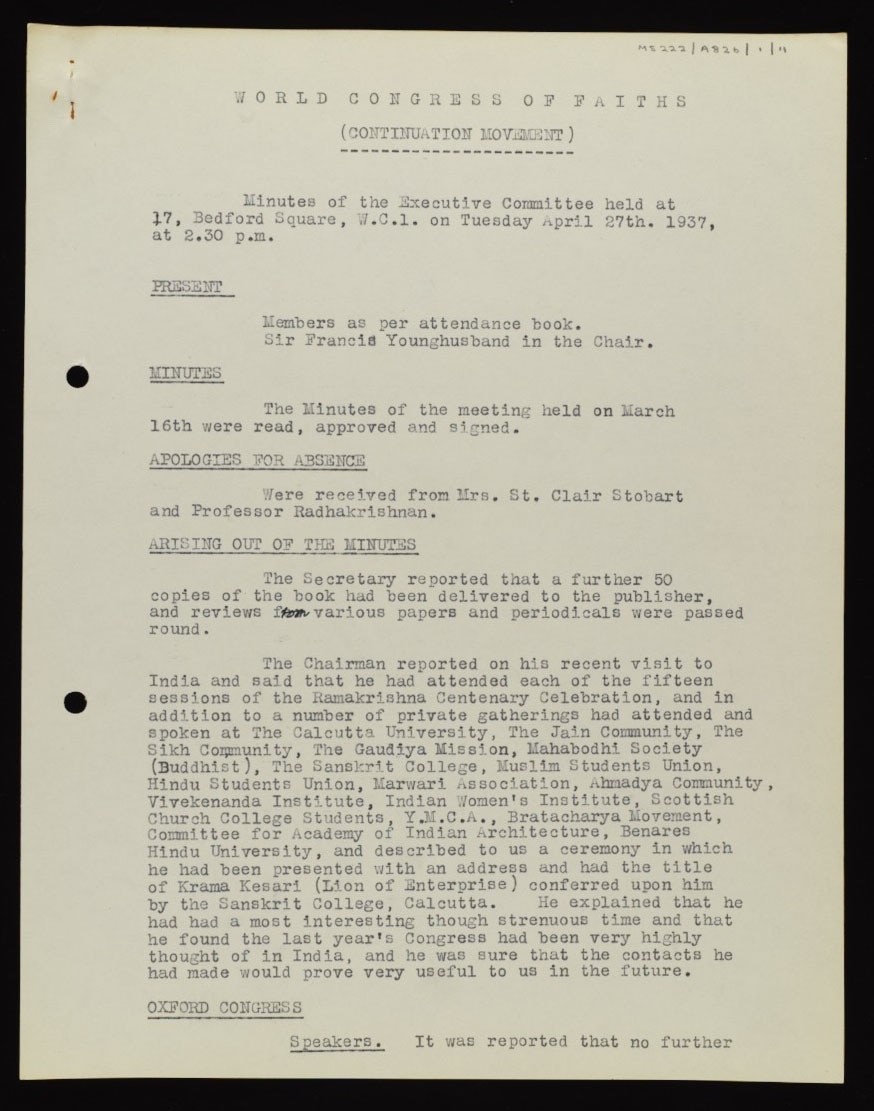
In June 1937, a meeting of the World Fellowship of Faiths was held in Fleetwood, where Hazrat Maulana Jalal-ud-Din Shamsra and Hazrat Maulvi Abdur Rahim Dardra represented Islam. A newspaper announced:
“The preacher at the morning service will be Maulana J. D. Shams, a distinguished Arab, and in the evening Mrs. Clarence Gasque, mother-in-law of Blackpool’s M.P., and international director of the World Fellowship of Faiths, will give the address.”35
Concerning Mrs Gasque, it is important to note that during her visit to India in 1938, it was reported by the press that she was expected to meet various leaders of India, including “the head of the Ahmadiyya Movement.”36
The Lancashire Daily Post of 8 June 1937 mentioned the “Burnley Faith Fellowship Meeting” and reported that it was “presided over by Mr. W. Munn Rankin, principal of Burnley Technical College, and supporting were the Rev. C. B. Johnson, Burnley; the Rev. A. Porter, Fleetwood: Hindu Kedar Nath Das Gupta, Moslem Moulana J. D. Shams and Charles F. Weller, American.”
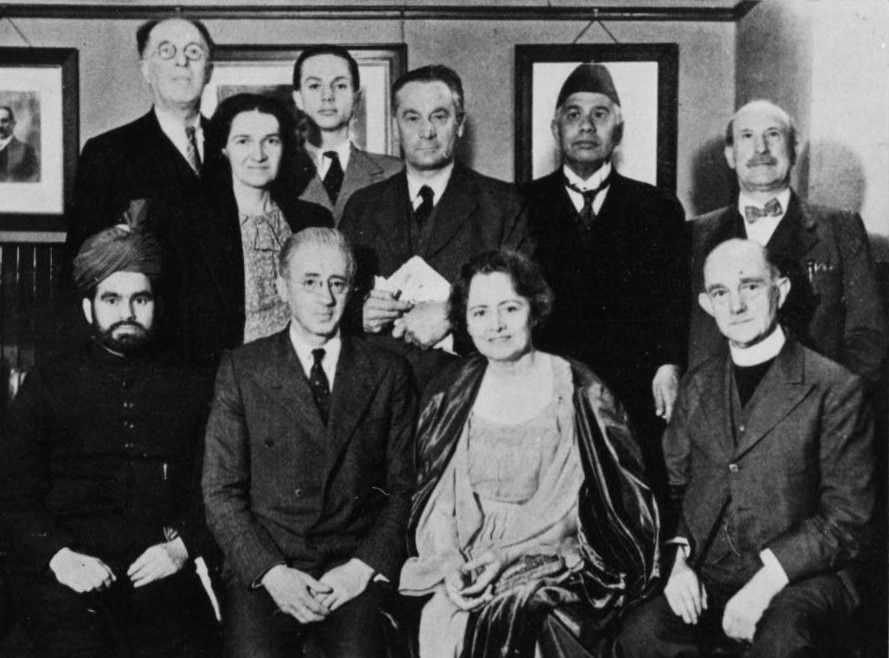
The Fleetwood Chronicle of 11 June 1937 mentioned this meeting under the heading “Turbans in Pulpit”.
A month later, in July 1937, the International Assembly of the World Fellowship of Faiths was held where Ahmadi missionaries and Hazrat Sir Zafrulla Khanra delivered speeches.
The official records of the World Congress of Faiths show that during a meeting of the Executive Committee in May 1937, it was suggested that Sir Zafrulla Khanra be requested to speak at an upcoming Public Meeting on “The World’s need of Religion” and during the next meeting, it was informed that Sir Zafrulla Khanra spoke on telephone, saying that he would confirm about his availability in a few days.
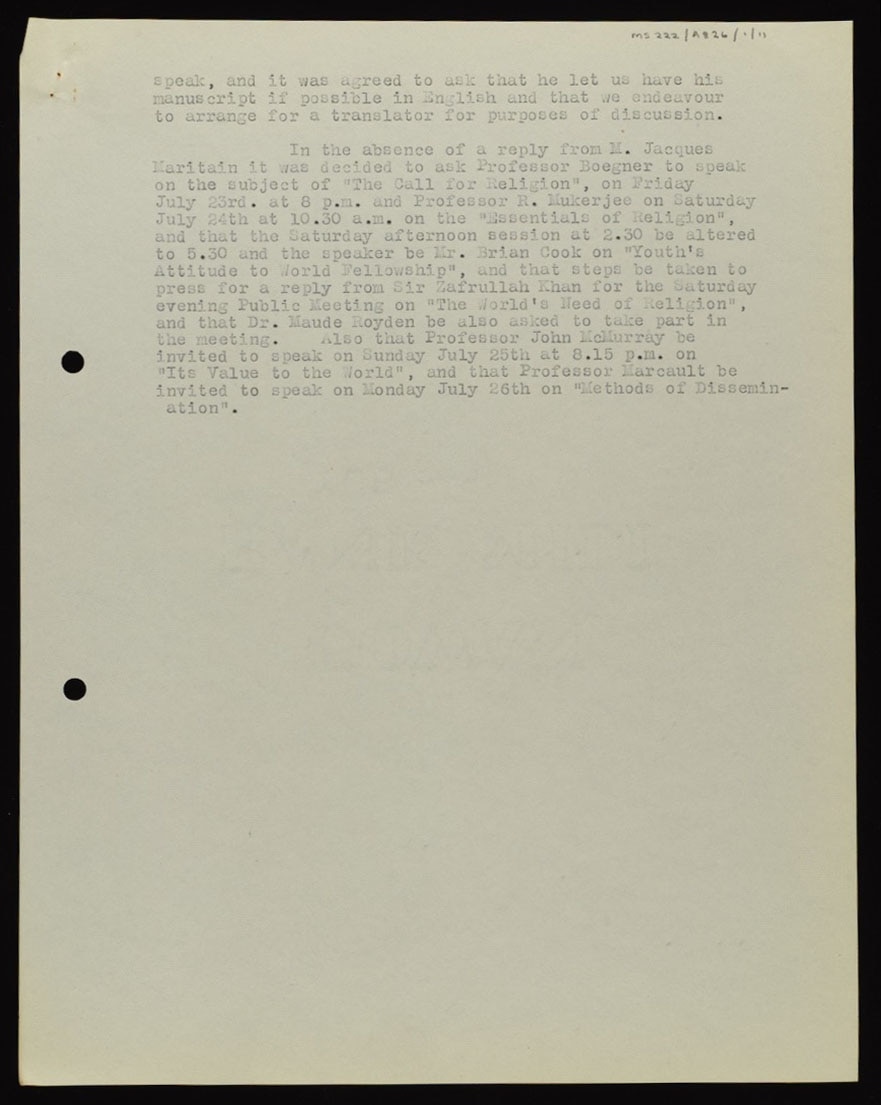
A news report stated under the heading “World Fellowship of Faiths: Southfields Imam Speaks”:
“His Eminence the imam of the London Mosque. Southfields, Moulvi A. R. Dard. M.A. B.T. spoke on Wednesday afternoon at the International Assembly of the World Fellowship of Faiths, at Whitefield’s Institute, Tottenham Court-road. He dealt with religious work in churches, mosques, etc. The Imam is a missionary to England from the Ahmadiyya Movement, which was responsible for the building of the London Mosque.
“The deputy Imam of the Mosque, Maulana J. D. Shams, gave the call to prayer at the opening session of the assembly on Wednesday last week.
“Sir Mohammad Zafrullah Khan, who addressed a meeting at the City Temple, attends the mosque at Southfields, and is a member of the community. He is a Moslem leader in India, a member of the Governor-General’s Executive Council, and was an Indian representative at the King’s Coronation.”37
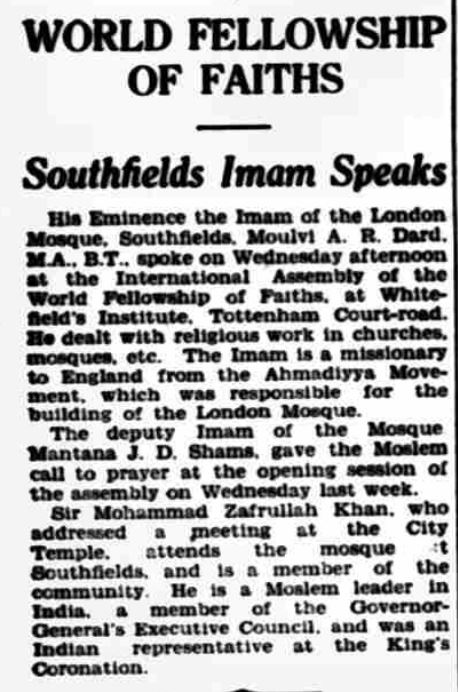
It was reported in Al Fazl on 8 August 1937 that during his speech, Hazrat Maulvi Abdur Rahim Dardra read out an excerpt from a book of Hazrat Musleh-e-Maudra, titled Ahmadiyyat.
In the following years, various meetings of the World Congress of Faiths were also held and attended by Ahmadi missionaries as representatives of Islam where they spoke about the need for world peace and religious harmony. Hazrat Maulvi Jalal-ud-Din Shamsra was also a member of the British National Council of this Congress, as can be seen in the official records.

The Ahmadiyya missionaries, during their speeches at those congresses, highlighted the fact that the Promised Messiah whose advent was awaited by all major religions has already come and it is through him alone that the world can unite together and witness a lasting peace.
Endnotes
1. The Toronto Mail, 26 January 1894, p. 4
2. League of Nations Records, UNO Archives, “Publicity – Lectures by Mr. Habicht – Various correspondence”, Reference code: R5165/13/15407/1265.
3. Westminster Gazette, 22 July 1927, p. 2
4. The Advertiser of Adelaide, 10 December 1927
5. League of Nations Records, UNO Archives, “The Threefold Movement – Union of East and West – The League of Neighbours – Fellowship of Faiths”, Reference code: R3583/50/6842/6842
6. The Occult Digest, July 1929, Vol. V, No. 7, p. 25
7. Chicago Daily Tribune, 10 May 1929, p. 1
8. The Christian Century, 23 April 1930, Vol. XLVII, No. 7, p. 540
9. The Community Churchman, May 1932, Vol. XII, No. 2, p. 14
10. The Sunday School Times, 12 September 1931, p. 1
11. The Jewish Theosophist, April-June 1932, p. 3
12. League of Nations Records, UNO Archives, “Correspondence with Chicago’s Fellowship of Faiths”, Reference code: R3605/50/32493/32493.
13. Ibid., “The Threefold Movement – Union of East and West – The League of Neighbours – Fellowship of Faiths”, Reference code: R3583/50/6842/6842
14. Tarikh-e-Ahmadiyyat, Vol. 6, p. 118
15. The Indian Express, 7 October 1933, p. 9
16. World Fellowship: Addresses and Messages by Leading Spokesmen of All Faiths, Races and Countries, [Ed.] Charles Frederick Weller, Liveright Publishing Corporation, New York, 1938, p. 501
17. The New York Times, 19 June 1933
18. The Civil and Military Gazette, 23 August 1933, p. 1
19. The Modern Review, July 1934, p. 34
20. World Fellowship: Addresses and Messages by Leading Spokesmen of All Faiths, Races and Countries, [Ed.] Charles Frederick Weller, Liveright Publishing Corporation, New York, 1938, pp. 16-17
21. Tarikh-e-Ahmadiyyat, Vol. 6, p. 119
22. The Moslem Sunrise, April-July 1933, p. 43
23. Ibid., p. 44
24. World Fellowship: Addresses and Messages by Leading Spokesmen of All Faiths, Races and Countries, [Ed.] Charles Frederick Weller, Liveright Publishing Corporation, New York, 1938, pp. 833-836
25. The Moslem Sunrise, April-July 1933, p. 43
26. World Fellowship: Addresses and Messages by Leading Spokesmen of All Faiths, Races and Countries, [Ed.] Charles Frederick Weller, Liveright Publishing Corporation, New York, 1938, pp. 836-840
27. The Moslem Sunrise, April-July 1933, p. 43
28. World Fellowship: Addresses and Messages by Leading Spokesmen of All Faiths, Races and Countries, [Ed.] Charles Frederick Weller, Liveright Publishing Corporation, New York, 1938, pp. 840-851
29. The Moslem Sunrise, April-July 1933, p. 43
30. World Fellowship: Addresses and Messages by Leading Spokesmen of All Faiths, Races and Countries, [Ed.] Charles Frederick Weller, Liveright Publishing Corporation, New York, 1938, p. 17
31. League of Nations Records, UNO Archives, “Item WILPF/070_12 – Reel 70, 12/12”.
32. A Wider Vision: A History of the World Congress of Faiths 1936-1996, Oneworld Publications, Oxford, 1996, p. 45
33. A Venture of Faiths, pp. 109-110
34. The Latter-day Saints’ Millennial Star, 16 July 1936, Vol. 98, No. 29, p. 455
35. Fleetwood Chronicle, 4 June 1937, p. 6
36. The Bombay Chronicle, 13 February 1938
37. South Western Star, 16 July 1937, p. 10

